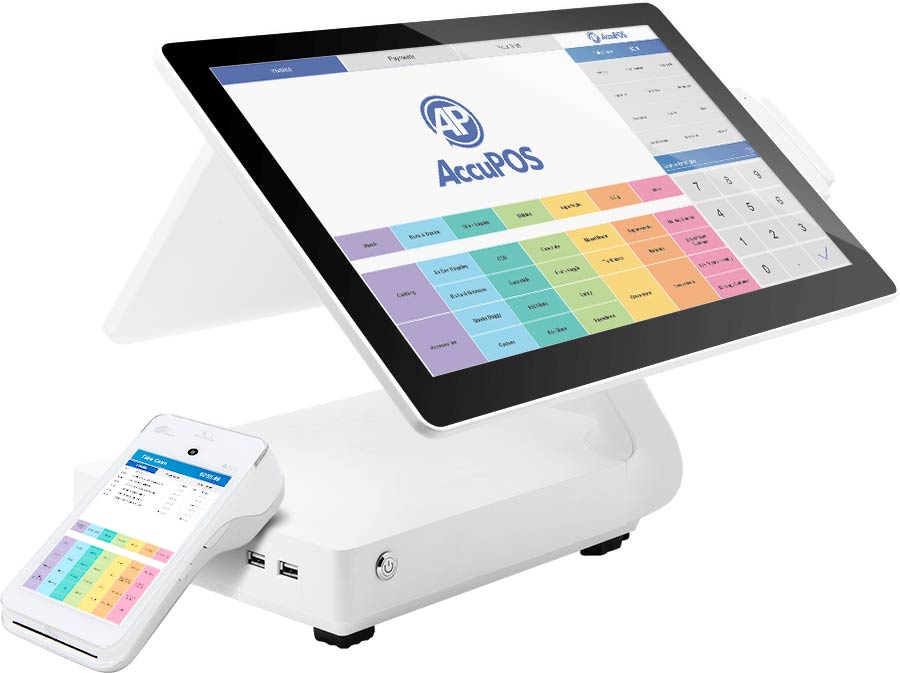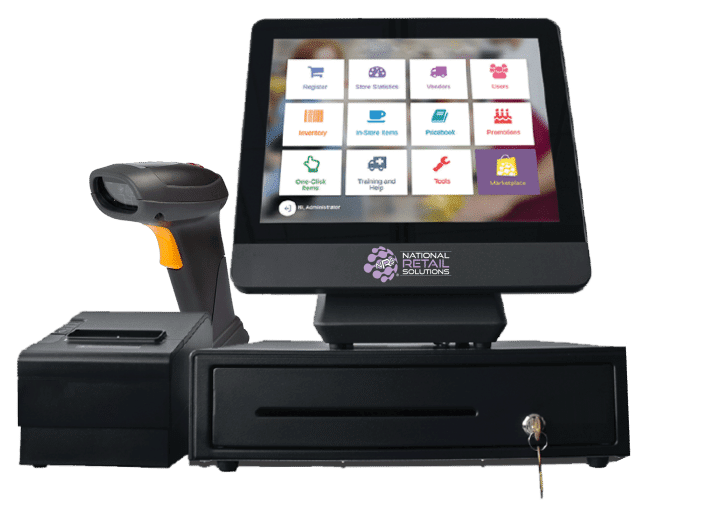A Biased View of Pos Machine

Clover POS: Retail Point-Of-Sale Solutions Streamline Transactions
What Does Restaurant Pos Do?

Hardware Parts of a Point of Sale System What makes a POS system tick? It's not just software application; the hardware plays here a starring function. Think about it as the body to the software's brain. Without the ideal hardware, even the most sophisticated POS software application is simply a pretty face. Vital POS Hardware So, what are the must-haves? Let's simplify. The main processing unit, frequently a computer system or tablet, is the heart of the operation. The display or touchscreen display enables personnel to engage with the system. A barcode scanner accelerate the checkout process. Remember the days of manually going into each code? The dependable invoice printer supplies clients with a record of their purchase. A money drawer keeps your money safe and organized. A card reader allows clients to pay with credit or debit cards. Diving Deeper: Beyond the Essential But wait, there's more! Depending upon your company, you might require specialized hardware. For instance, a dining establishment might integrate cooking area printers to relay orders, while a store might utilize label printers for item tagging. Ever wonder how your local bakeshop immediately prints those delicious-looking labels? Selecting the Right Hardware: A Balancing Act Selecting the right hardware isn't practically purchasing the most costly devices. It's about finding the sweet spot between functionality, resilience, and spending plan. A small company simply starting out may select a more fundamental setup, while a high-volume retailer will require robust, high-performance devices. Is it much better to purchase brand-new or used? Consider your choices carefully. A brand-new system offers the most recent innovation and warranty defense, but a reconditioned system can save you money. The Future of POS Hardware What does the future hold? Expect to see a lot more integration with mobile phones, biometric scanners for employee authentication, and advanced analytics dashboards showed on bigger, clearer screens. Think of a world where stock is immediately upgraded in real-time as products are scanned-- a world where you can track your very popular product from anywhere in the world. The possibilities are endless, and the hardware is constantly evolving to satisfy the demands of today's companies. Are you all set to update your point of sale system?
Software Application Features and Capabilities: The Heart of Your POS System
Ever watch a seasoned barista move through a hectic morning rush? Their trick isn't simply caffeine; it's a seamless dance with their POS system. The software application is the conductor of your service symphony, managing everything from sales to stock. What notes should you be listening for? What capabilities really matter in today's market?
Inventory Management: Beyond Counting Beans
Forget spreadsheets that haunt your dreams. Modern POS systems provide real-time stock tracking, alerting you when your stock of artisanal coffee beans dips precariously low. Think about it as a digital guardian angel, avoiding those awkward "Sorry, we're out!" minutes to clients. What if you could likewise predict demand based on historic information? Numerous systems now use forecasting tools, an effective weapon versus overstocking and lost sales. This assists avoid the circumstance of lacking popular items or accumulating excess inventory of slow-moving products, both of which can constrain cash circulation and area.
Sales Reporting and Analytics: Decoding the Information
Sales information is the brand-new gold, and your POS system is the miner. Forget feeling in one's bones how much you sold today. Dive deep into the data to reveal patterns, recognize your best-selling products, and comprehend consumer behavior. Which menu item pairs completely with the day-to-day special? Which promo resonated most with your customers? These insights are not just intriguing; they're actionable intelligence. Without dependable sales reporting, browsing the complexities of organization decision-making becomes like sailing without a compass, increasing the chance of missteps and missed chances.
Consumer Relationship Management (CRM): Structure Bridges, Not Walls
Remembering a routine customer's name and favorite order is captivating, however scaling that individual touch is challenging. POS systems with CRM capabilities enable you to track consumer purchase history, choices, and even birthdays. Picture instantly offering a discount on their birthday-- a little gesture that promotes loyalty and encourages repeat organization. But there is the potential snag of bad information quality, which can result in unreliable customer profiles and inefficient marketing efforts.
Payment Processing: Enhancing the Deal
The checkout experience can make or break a sale. Smooth integration with various payment approaches-- credit cards, mobile wallets, even copyright-- is non-negotiable. Can your system manage split payments? Does it use protected tokenization to secure customer information? A clunky payment process is like striking a sour note in your service symphony, possibly disrupting the entire efficiency. Ensuring compatibility with evolving payment technologies and adherence to security requirements are vital for preserving client trust and operational efficiency.
Staff Member Management: Keeping the Team in Sync
From clocking in and out to managing approvals and tracking efficiency, staff member management includes improve operations and improve accountability. Is scheduling a headache? Lots of POS systems offer incorporated scheduling tools, enhancing staffing levels based on anticipated demand. A common challenge that is typically neglected is the challenge of incorporating staff member management functionalities with payroll systems, which can lead to mistakes and inefficiencies in wage computations.
Advanced Features: Leveling Up Your Operations
- Table Management: Suitable for restaurants, this feature permits you to envision your dining room, track table status, and handle appointments.
- Loyalty Programs: Reward your finest consumers and encourage repeat service with incorporated commitment programs.
- Online Purchasing Integration: Effortlessly integrate your POS system with online ordering platforms to expand your reach.
Selecting the best POS system is about more than simply performance; it has to do with discovering a partner that can grow with your company. Consider your present needs, expect future growth, and don't hesitate to ask the hard concerns. The right software application can change your organization from a chaotic cacophony into a harmonious masterpiece.
Industry-Specific POS System Applications
Think about the local bakery, dynamic with morning clients craving fresh croissants. A generic POS system might handle deals, but can it manage complex recipes, track ingredient stock, or automatically adjust production schedules based on sales information? Probably not. That is where the charm of industry-specific POS systems shines.
Dining establishments and Hospitality
For dynamic restaurants, speed and precision are critical. How many times have you seen servers managing orders, modifications, and splitting expenses, all while trying to provide exceptional service? A dining establishment POS system simplifies these processes, permitting for table management, kitchen area order tickets, and even online buying integration. These systems frequently consist of features like ingredient-level inventory tracking, important for managing food costs and reducing waste. Ever wonder why your favorite dish is often unavailable? It may stem from an absence of appropriate inventory management.
- Table Management
- Kitchen Order Tickets
- Online Ordering Combination
- Ingredient-Level Stock Tracking
Retail Solutions
Retail, with its diverse inventory and consumer interactions, requires a various set of tools. Envision a shop clothing shop struggling to keep an eye on sizes, colors, and seasonal collections utilizing a fundamental checkout system. An industry-specific retail POS system offers features like barcode scanning, customer loyalty programs, and in-depth sales reporting. These systems can even incorporate with e-commerce platforms, offering a smooth omnichannel experience for customers. Did you understand some retail POS systems can predict future sales trends based upon historic information? Now that is powerful!
The Perils of an Inequality
Selecting the wrong POS system can develop significant operational hurdles. A clothing shop using a dining establishment POS, for instance, would discover it unsuitable for managing inventory with sizes and colors. The absence of proper reporting and analytics could cause misinformed buying decisions and lost revenue. The outcome could be similar to attempting to fit a square peg in a round hole.
Key Factors to consider
Selecting an industry-specific POS system needs mindful assessment. Believe about your business's distinct requirements and operational workflows. Does the system integrate with existing software application? Does it offer the necessary reporting capabilities? Is it scalable to accommodate future growth? A well-chosen POS system is not simply a deal tool; it's a tactical possession that can drive effectiveness, enhance client fulfillment, and eventually, increase your bottom line. Keep in mind, it is an investment in your business's future, not just an expenditure.
Security Factors To Consider for Point of Sale Systems
Ever heard the tale of the mom-and-pop store that lost everything because of a single, neglected security flaw in their POS system!.?. !? It's a cautionary tale, and it highlights an important aspect frequently overshadowed by the allure of elegant features and structured operations. The truth is, a POS system is only as good as its security. What good is a system that crunches numbers in a flash if it permits wrongdoers to swipe consumer's data simply as quickly?
The Vulnerability Minefield
The digital landscape is a battlefield. Every POS system, regardless of size or sophistication, is a potential target. Are you really got ready for the hazards lurking around the corner? The real pinch comes when you discover that your outdated software has a gaping hole that hackers can make use of, turning your service into an unwitting accomplice in identity theft. The trouble is that hackers are crafty and are constantly altering their techniques.
Typical Security Gaps and Professional Tips
- Weak Passwords: "Password123" isn't cutting it. Use strong, distinct passwords for all POS system accounts and alter them regularly. Two-factor authentication is a must.
- Unsecured Networks: Your Wi-Fi is like leaving the front door open. Protect your network with strong encryption (WPA3 if possible) and think about a different network for your POS system.
- Out-of-date Software: Software application vendors spot security holes all the time. Stopping working to update is like welcoming problem. Set up automatic updates or schedule routine maintenance.
- Staff member Training: Your staff is your first line of defense. Train them to acknowledge phishing efforts, protect passwords, and report suspicious activity.
Data Encryption: Your Shield Versus the Dark Arts
Think of data encryption as a secret code. It scrambles sensitive details, like credit card numbers, making it unreadable to unapproved users. Without file encryption, your customers' monetary details resemble sitting ducks, ripe for the selecting by cybercriminals. It's not just about protecting your consumers; it's about securing your reputation and preventing substantial fines.
PCI Compliance: The Rulebook You Can't Overlook
If you accept charge card, you're bound by the Payment Card Market Data Security Standard (PCI DSS) It's a set of security standards created to secure cardholder data. Failing to comply can result in fines, charges, and even the loss of your ability to process credit card payments. It's a headache, yes, however it's a needed one. Think about PCI compliance as the cost of doing service in the digital age.
Consider this: every deal processed through your point of sale is a potential entry point for destructive stars. By executing robust security measures, you're not simply securing your company; you're safeguarding your customers' trust and making sure the long-term viability of your operations. The security of your POS system isn't simply a technical issue; it's a company important. It needs continuous watchfulness, proactive procedures, and a commitment to remaining ahead of the curve.